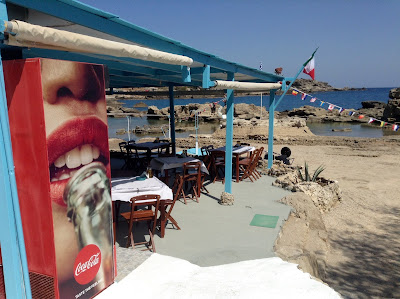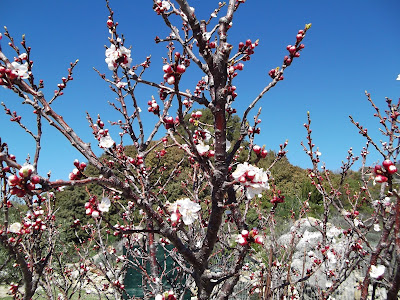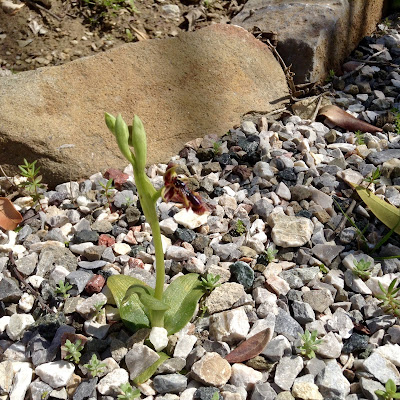Well, I've finally got around to interviewing a male author in my occasional series of interviews with writers on a Greek theme. I read Richard Clark's book on Rhodes a while back and was very impressed with his writing style, plus his depth of research. Here is a man who loves what he writes about and it shines through.
Richard Clark first visited Greece on a whim in 1982 when he left the UK to live and work as a teacher in Crete. He fell in love with the country and has been visiting regularly ever since. On returning to the UK he worked as a journalist for the BBC, national newspapers, and over the last 15 years has edited four of the UK’s top consumer magazines.
He has written a number of books about the Greek islands, most notably Crete, Rhodes and Corfu, all of which have reached the No.1 slot in their relevant Amazon bestseller charts. Richard is the son of the late crime writer Douglas Clark, is married to Denise and has two grown up children Rebecca and James.
Somerset Maugham Award, Samuel Johnson Prize, and Thomas Cook Travel Book Award winning writer Mark Hudson said of his work: ‘Clark is particularly good on the colours, flavours and scents of Greece. He has got under the skin of the place in a way few outsiders have been able to.’
While bestselling novelist Sara Alexi comments: ‘There is poetry in Richard Clark’s words. I recommend anyone who loves Greece to read his work.’
 |
| Richard, at home in Kent. |
So, let's get started. I think you'll find Richard answers my questions in some depth.
Where do you live?
I live with my wife Denise in a 160 year old cottage in a village near Tunbridge Wells in Kent in the UK. We have lived here for more than 30 years and our family grew up in the house and still live nearby. My daughter is a veterinary surgeon in the village and lives with her partner in a house just up the road and my son is a musician and he and his wife have a house not far away. It is the closeness of our family that has kept us here and we have just finished a top to toe renovation of the house which took almost all of last year. I hope it will remain our home for many years, we’re a close knit family and both my daughter and daughter –in- law are expecting babies this year so our family is ever-expanding and it is good to be close to them all. We are also in the process of looking for a house on Crete as now I have given up full-time journalism in London to concentrate on writing books I am able to work anywhere and as we spend so much time in Greece it makes sense to buy there.
What do you write about?
With the exception of a children’s book, which I actually wrote whilst living in Crete in the early Eighties, all my books have been about Greek Islands. The books could broadly be described as travelogue, personal accounts of places I have visited, people I have met, food I have eaten and experiences I have had in that wonderful country since I lived there all those years ago and the regular return visits I have made since.
Why Greece?
It’s easy to answer that question now. Writing and Greece are two of the greatest pleasures life holds for me, so with the adage about always writing about something you know and love, it makes perfect sense for Greece to be the subject of my labours. If you are asking how I discovered Greece that was a less conscious decision, indeed much more serendipitous. In 1982 I was a not-long out of college English Literature graduate wanting to make a career in anything remotely relevant to what I had studied. I was working editing scientific journals and freelance writing for any newspaper that would take my stuff. I must have had a bad day at work when I saw an advertisement in the Guardian newspaper for English Language teachers in Crete. On a whim I applied, and much to my surprise, in several months, was on a plane to Greece with just a holdall containing a few clothes and books. I was going to a place I knew little or nothing about, with nowhere to live, to do a job I had never done before in a country where I couldn’t speak a word of the language. It was a situation which had all the ingredients of being a disaster but from the moment I set foot on Crete it felt like home. I was made welcome by the hospitable Cretans and luckily it turned out I wasn’t a bad teacher either. I fell in love with the country then and ever since have always been drawn back there.
 |
| Agios Nikolaos. |
How long does it take you to write a book?
I think having been a journalist for forty years has helped me write quite quickly. I am used to working to deadlines and am quite efficient in my researching. That said, until the end of last year I was fitting in writing my books around a full time job editing magazines in London, so was only managing to produce one book a year. Now I am writing full time I hope to at least double that output. One of my books takes about 3 months to write working every morning, then the rewrites take about a month then it goes to my editor and I probably take the best part of another month putting in any final changes before it goes for designing, formatting and is finally published.
What do you enjoy most about writing?
For me I have little choice, writing is almost a compulsion, although luckily I do enjoy much about the process. It provides a creative outlet which allows me to make sense of things, to order my thoughts. It is therapy, and finishing a book brings a tremendous sense of achievement and satisfaction and that is heightened by knowing that readers have appreciated what you have written.
What, in your view, is/has been the greatest gift from Greece to the world?
Gosh, there is so much that Greece and the Greeks have contributed to our modern societies it is difficult to know where to start. Despite what they have bestowed on us in terms of language, philosophy, medicine, engineering and sport there is one thing that stands out for me, and that is their enduring generosity of spirit and love of life, whatever the world throws at them. We could all learn a lot about the ability many Greeks have to live in the moment.
How do you come up with an idea for a book?
As a writer of non-fiction I probably have an easier time of it than those authoring fictional works. The books I have so far written have mostly followed a similar format. I suppose they are quite journalistic in that they are divided into chapters of varying lengths, each piece being a self contained essay about a place, person or experience I have encountered from a very personal perspective. They have been described as travel companions rather than guides, and I like that description. I take copious notes when I am travelling or just whenever something comes to mind. I am naturally quite inquisitive so am constantly researching the what, whys and wherefores of things I don’t know the answers to.
How do you go about writing, that is to say, are you organised, do your research, disciplined, are you a messy sort who gets it done one way or another?
I think I am quite organised and meticulous although to look at my study you wouldn’t believe it. I need to be self-disciplined to work and get up early every day and go to my study and shut myself off. My dogs now rush upstairs to the room where I write when I say ‘go to work’ and sleep until I’ve done my stint for the day. I plan my book as I would do a news running order, firstly making a headline list of subjects for chapters under which I transcribe thoughts and ideas from my notebooks and then expand these into the finished article. Even if I am struggling I make myself write something, and try not to go back over my work until the rewriting stage so I retain the flow and momentum of the work. The temptation for me always used to be constantly reviewing and rewriting as I went along which meant I got nowhere fast. I try to finish writing with a good idea of what I am going to write about the following day. This seems to focus my thoughts in the intervening hours so that when I sit down again I always have something to get down onto my laptop.
Which other authors do you read?
I love reading and since I have given up the commute to London do not have the long journeys to indulge my passion, so I make sure I put aside a couple of hours each day to sit down with a book. I studied English Literature for my degree and still retain a liking for the classics but also love crime writing, authors like Camililleri, Donna Leon, C.J Sansom, Gordon Ferris, Henning Mankell and Stieg Larsson to name but a few. In terms of Greek- themed books Kazantzakis is a must as well as Durrell, Miller, Leigh Fermor and The Magus by John Fowles. I also read a lot of contemporary authors writing about Greece and, present company excepted, I enjoy the work of Sara Alexi, Anne Zouroudi, Marjory McGinn, Victoria Hislop and Jennifer Barclay, who I am lucky enough to have edit my books. I also like poetry, in particular T.S. Eliot and if I’m allowed to include him as a writer, Bob Dylan [absolutely! -JM].
What's your preferred kind of music?
I like most styles of music, but suppose I am a child of my time. As I’ve just said I love Dylan. I also listen a lot to the Stones, Floyd and Zeppelin all of whom I have seen live. Leonard Cohen, Joni Mitchell and David Bowie are also favourites. I go and watch music locally when I can and try to play the guitar myself, although I am not getting any better with age I am told. [This man has stolen my record collection!! - JM]
Do you like Greek music and if so, which kind?
Greek music is wonderful, but I am not very knowledgeable about it. I do like rebetiko, and the music of Haris Alexiou I have a particular affection for as I was given a mix tape of her work by a friend who was quite an important musical director in Heraklion when I lived there. I also love Cretan lyra music. I was lucky enough to meet Ross Daly on many occasions and have often seen him play live. I still seek out tavernas and bars where live music is on. Authentic Cretan music is so elemental to the people’s being. A combination of Greek music, food, wine and dancing in an idyllic location is hard to beat.
Favourite Greek dish?
 |
| The gulf of Mirabello |
I love cooking and eating and am planning a book highlighting some of the great dishes of Crete and the places that serve them. In my opinion, the best food cooked in Greece is the most simple made with the freshest of ingredients. Grilled fish and salad, or souvlaki are favourites. In my younger days I was a big fan of Gyros as it is cheap, filling and portable, the ultimate take away for a struggling teacher. I still enjoy it now but have to be careful how much of it I eat. I have eaten so many wonderful dishes it is hard to single any out, but recent favourites are the slow cooked ‘Lamb Olondi’ a superb twist on kleftico served up in the taverna from which the dish takes its name in Elounda; roasted pork shank in the Palm Tree taverna in Paleochora; or salt baked sea bass in Kanali, a beautiful restaurant beside the small canal which links the gulf of Mirabello with the gulf of Korfos near Elounda.
Favourite place in Greece and the reason(s)?
 |
| Canal Spinlonga. |
 |
| Mohlos. |
A difficult question to answer as every time I visit Greece I discover new places that I love. So If I have to answer it would be Crete, as I have such an emotional attachment to it as it was my first experience of Greece. I also love Rhodes which we have spent quite some time in over the last few years. Around and about Agios Nikolaos in north east Crete is probably the one which resonates most as we have friends in the villages near there and have been visiting the area since the year dot, I love the Spinalonga peninsula and also the beautiful village of Mohlos to the east of the city where the sunsets are like a Monet masterpiece most evenings. Sitting in Ta Kochilia tavern sipping a glass of white wine accompanied by a dish of anchovies and a salad looking across to the tiny offshore island of St Nicholas is as close to heaven on earth as it gets in my book.
What links would you like the readers to explore in connection with your work, including, of course, sites where your work may be purchased?
The best place to buy my books should you want to is on the Amazon store relevant to where you live. They can also be bought in some bookshops in Greece. Crete – A Notebook is available in both English and a Greek language translation.
This is the link to my author page on Amazon UK:
Everyone is welcome on my books page on Facebook at:
And finally, reading device or real book?
I use both, a Kindle app on my iPad if I am on the move and a real book if I am curled up in front of the fire reading at home.
 |
| Paleochora sunset. |
Well, there you go folks, hopefully you'll want to check out Richard's work after this if you haven't already. I have to say in my humble opinion, that if you're planning to visit Crete, Rhodes or Corfu then to read one of Richard's "Notebooks" will enhance your visit immeasurably. Even if you're familiar with those islands, you'll delight in Richard's notes on them and no doubt learn stuff you didn't already know too.
There's another interview (two in fact) in the pipeline. I do hope you're enjoying them, because I certainly enjoy doing them.








































